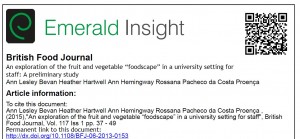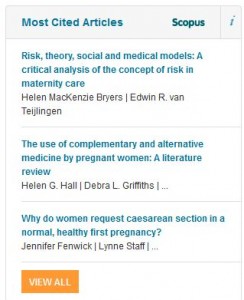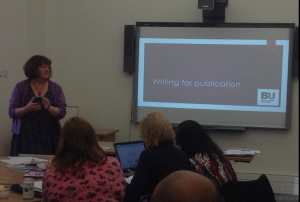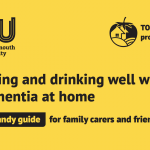Heather Savigny (Media School) recently wrote for the LSE Democratic Audit blog about the media’s cover up in the recent Page 3 debacle. You can read more about it here http://www.democraticaudit.com/?p=10580
Monthly Archives / January 2015
Cyber Security Seminar: Persuasive Technology for Information Security – Today, 4pm
Our next Interdisciplinary Cyber Security Seminar will take place TODAY (Tuesday, 27th January) at 4pm. The seminar will take place at Poole House in P335 LT, and will be free and open to all.
Our speaker will be Marc Busch. Marc is scientist at the AIT – Austrian Institute of Technology and is active at the intersection of persuasive technology and usable privacy and security. Furthermore, he is specialized in advanced quantitative and qualitative usability and user experience methodology, research methods and statistics in Human-computer interaction. Marc is involved in several international and national research and industrial projects, such as MUSES – Multiplatform Usable Endpoint Security. Before joining AIT, Marc was at CURE – Center for Usability Research & Engineering, where he focused on user experience and usability.
Abstract: Persuasive Technology is a vibrant field of research and practice, aiming to change the attitude or behavior of people. Persuasive technology has various different application areas, e.g. games motivating physical activity. An emerging application area is persuasive technology to increase information security and to engage people to protect their privacy. In the seminar, participants will hear about design principles for persuasive technology for promoting information security and also about methods to evaluate persuasive technology. Concrete examples and “best practices” will be given from a recent research project, in which persuasive technology is used in organizations to make employees comply with information security policies.
31 publications by January 31st!
My contribution to the BU Research Blog this year started on 3-1-2015 under the heading First BU publicatio n of 2015. I soon discovered that with loads of journals publishing their first issue of the new year in early January and books being published early in the new year (rather than late in the previous one) the Faculty of Health & Social Sciences had quite a few new publications lined up. It seems a nice idea to write another BU Research Blog under the title ’20/20′ referring in our case to twenty publications by January 20th with wordplay on the 20-20 perfection vision. But before January 20th the Faculty of Health & Social Sciences had already more than 20 publications.
n of 2015. I soon discovered that with loads of journals publishing their first issue of the new year in early January and books being published early in the new year (rather than late in the previous one) the Faculty of Health & Social Sciences had quite a few new publications lined up. It seems a nice idea to write another BU Research Blog under the title ’20/20′ referring in our case to twenty publications by January 20th with wordplay on the 20-20 perfection vision. But before January 20th the Faculty of Health & Social Sciences had already more than 20 publications.
The plan changed to r eport 25 publications by January 25th. This time the title in my head was ‘In the month 25-25 …’ a poor wordplay of the song ‘In the year 2525’. In The Year 2525 (Exordium & Terminus) was a hit in my youth (in the late Sixties by the US duo Denny Zager and Rick Evans). Unfortunately, this plan was short-lived too as I was made aware of several publications by Faculty of Health & Social Sciences colleagues in the space of three days.
eport 25 publications by January 25th. This time the title in my head was ‘In the month 25-25 …’ a poor wordplay of the song ‘In the year 2525’. In The Year 2525 (Exordium & Terminus) was a hit in my youth (in the late Sixties by the US duo Denny Zager and Rick Evans). Unfortunately, this plan was short-lived too as I was made aware of several publications by Faculty of Health & Social Sciences colleagues in the space of three days.
Hence the final attempt ’31 publications by January 31st!’ (published today 26th January) before I find out about further publications!
Prof. Edwin van Teijlingen
Centre for Midwifery, Maternal & Perinatal Health
Faculty of Health & Social Sciences
The list of 31 Faculty of Health & Social Sciences publication for early 2015, comprising 21 papers and ten book chapter:
- Hemingway, A., Norton, L & Aarts, C. (2015) Principles of Lifeworld Led Public Health Practice in the UK and Sweden: Reducing Health Inequalities Nursing Research & Practice, Vol. 2015 Article ID 124591, 4 pages
- Jonathan Williams and his colleagues at Cardiff University published: ‘Development of a computation biomechanical model for the investigation of infant head injury by shaking’ Medicine, Science and the Law, http://msl.sagepub.com/content/early/2014/12/30/0025802414564495.abstract
- Bernardo G.L., Pacheco da Costa Proença R, Cristin M, Calvo, M., Fiates, G.M.R., Hartwell H. (2015),”Assessment of the healthy dietary diversity of a main meal in a self-service restaurant”, British Food Journal, 117(1): 286 – 301.
- Ashencaen Crabtree, S., Parker, J. (2015) Reflections on Social Work and Human Rights, SUHAKAM Malaysian Journal of Human Rights Journal, pp.19-30 (forthcoming)
- Ashencaen Crabtree, S., Parker, J., Azman, A., Masu’d, F. (2015) Typologies of learning in international student placements, Asia Pacific Journal of Social Work & Development. Advanced access/online Doi: 10.1080/02185385.2014.1003393
- Ashencaen Crabtree, S. and Parker, J. (2015) Being male in female spaces: Perceptions of male students on masculinity on a qualifying course. Revista de Asistenţă Socială, anul XIII, 4/2014, pp. 7-26, www.swreview.ro
- Simkhada, P.P., van Teijlingen, E., Marahatta, S.B. Mental health services in Nepal: Is it too late? Journal of Manmohan Memorial Institute of Health Sciences (accepted).
- Simkhada, P., van Teijlingen E., Winter, R.C., Fanning, C., Dhungel, A., Marahatta S.B. Why are so many Nepali women killing themselves? A review of key issues Journal of Manmohan Memorial Institute of Health Sciences (accepted).
- Simkhada, P., van Teijlingen, E. Wasti, S.P., Sathian B., Mixed-methods approaches in health research in Nepal (Editorial) Nepal Journal of Epidemiology (accepted).
- Galvin, K., Todres L (2015) Dignity as honour-wound: An experiential and relational view Journal of Evaluation in Clinical Practice.
- 16. Worswick, L., Little, C., Ryan, K., Carr, E. (2015),Interprofessional learning in primary care: An exploration of the service user experience leads to a new model for co-learning Nurse Education Today
- Murphy, J., Pulman, A., Jeffery, J., Worswick, L., Ford, G., 2015. Translating research into practice: Evaluation of an e-learning resource for health care professionals to provide nutrition advice and support for cancer survivors. Nurse Education Today, 35(1), 271-276.
- Hundley, V., Luce, A., van Teijlingen Do midwives need to be more media savvy? MIDIRS (accepted).
- Rachel Arnold published from her PhD research: Arnold, R., van Teijlingen, E.R., Ryan, K., Holloway, I. (2015) Understanding Afghan health care providers: A qualitative study of the culture of care in a Kabul maternity hospital, BJOG 122: 260-267.
- Angell, C., Alexander J, Hunt J (2015) ‘Draw, write and tell’: A literature review and methodological development on the ‘draw and write’ research method, Journal of Early Childhood Research 13(1): 17-28.
- Gyawali, B., Keeling, J., van Teijlingen, E., Dhakal. L., Aro, A.R. (2015) Cervical Cancer Screening: Ethical Consideration, Medicolegal & Bioethics 5 :1-6
- Grylka-Baeschlin, S., van Teijlingen, E.R., Stoll, K., Gross, M.M. (2015) Translation and validation of the German version of the Mother-Generated Index and its application during the postnatal period. Midwifery 31(1): 47–53.
- MacKenzie Bryers, H., van Teijlingen, E. Pitchforth, E., Advocating mixed-methods approaches in health research, Nepal Journal of Epidemiology (accepted).
- Hall, J., Hundley, V., van Teijlingen, E. The Journal editor: friend or foe? Women & Birth (accepted).
- Marsh, W., Colbourne, D., Way, S., Hundley, V., 2014. Would a student run postnatal clinic make a valuable addition to midwifery education in the UK? A systematic review. Nurse Education Today. (In Press)
- Bevan A.L., Hartwell H, Hemingway, A., Rossana Pacheco da Costa Proença (2015) An exploration of the fruit and vegetable “foodscape” in a university setting for staff: A preliminary study British Food Journal, 117(1): 37-49.
Book chapters:
- Edwin van Teijlingen published a chapter on ‘Sociology of Midwifery’ in: Sociology for Midwives, Deery, R., Denny, E. & Letherby, G. (eds.) published by Polity Pres
- PhD student Sheetal Sharma is co-author of a book chapter called ‘Customs and believes surrounding newborn babies in rural areas’ published The Dynamics of Health in Nepalet al. by Himal Books, Nepal.
- Benoit, C., Sandall, J., Benoit, C., Murray, S.F., van Teijlingen E., Wrede, S., & Declercq, G. New directions in global policy: maternal health. In: E. Kuhlmann, E., Bourgeault, I. (eds.) Palgrave International Handbook on Health Care Policy & Governance, Houndmills: Palgrave Macmillan (forthcoming 2015)
- Jenny Hall has a chapter forthcoming ‘Spirituality and compassion and maternity care’ in The Roar behind the silence: why kindness, compassion and respect matter in maternity care, S. Byrom & S. Downe (eds.) published by Pinter and Martin: http://www.pinterandmartin.com/the-roar-behind-the-silence.html?
- van Teijlingen, E, Simkhada, P., Wasti, P.P. (2015) Nepal is Changing: Modernisation and Diversity in Healthcare. In: Wasti, S.P., Simkhada, P.P. & van Teijlingen, E. (Eds.) The Dynamics of Health in Nepal, Kathmandu, Nepal: Social Science Baha & Himal Books: 1-15.
- Wasti, S.P., Simkhada, P.P. & van Teijlingen, E. (Eds.) (2015) Socio-Cultural Aspects of HIV/AIDS. In: The Dynamics of Health in Nepal, Kathmandu, Nepal: Social Science Baha & Himal Books: 47-62.
- Simkhada, B., Sharma, A., van Teijlingen, E., Silwal, R.C., Simkhada, P. (2015) Exploring Maternal Mortality Reduction. In: Wasti, S.P. et al. The Dynamics of Health in Nepal, Kathmandu, Nepal: Social Science Baha & Himal Books: 95-121
- Devkota, B., van Teijlingen, E. (2015) Exploring Rebel Health Services during the Maoist People’s War. In: Wasti, S.P. et al. (Eds.) The Dynamics of Health in Nepal, Kathmandu, Nepal: Social Science Baha & Himal Books: 122-130.
- Devkota, S., Maharjan, H.M., van Teijlingen, E. (2015) Media and Health. In: Wasti, S.P., Simkhada, P.P. & van Teijlingen, E. (Eds.) The Dynamics of Health in Nepal, Kathmandu, Nepal: Social Science Baha & Himal Books: 169-184.
- Parker, J. (2015) Single Shared Assessments in social work. In J.D. Wright (ed.) The International Encyclopedia of Social and Behavioral Sciences, 2nd edn, Elsevier, http://dx.doi.org/10.1016/B978-0-08-097086-8.28105-1 .
Cafe Scientifique 3rd February- Is reproduction in the sea lunacy? – Professor Matt Bentley
Lunacy, a term no longer in common usage, was used to describe brief periods of insanity related to phases of the moon. In the marine environment many marine organisms reproduce by shedding their eggs and sperm into the water column where a sperm then needs to find an egg for fertilisation to take place. Many species show reproduction that involves highly synchronised spawning to bring eggs together in time and space. Often these reproductive crises are associated with a particular phase of the moon, so represent what could be regarded as a type of lunacy. This Café Scientifique will explore the influence of the moon and other environmental cues in coordinating reproduction in marine animals.
We look forward to seeing you all at Cafe Boscanova, doors will be at 6:30 and the talk will begin at 7:30pm until 9pm.
All the best,
Research Photography Competition
Hello!
With the 15th February submission deadline fast approaching, I would like to send you a further reminder of this fantastic opportunity to capture your research into an image and upload it into a Research Photography Competition being launched in February/March. Is this something that’s of interest to you or could be of interest to others you know? Read below for details.
Research photography competition
Can you convey your research through an image? We are looking for academics and postgraduates to tell the story of their research through a photograph, which can be used to inspire current BU undergraduates.
Images will be showcased on the BU website in early 2015, where students and staff alike will be able to vote to choose their favourite images. The top 10 will be displayed across campus in April 2015.
Step 1: Take your photo!
You can be as creative as you like in capturing the essence of your research. You could take a photo of your research in progress, showing how it is developed. Or you could focus on the people involved – the people behind the research, or the people benefitting from it. Unusual or artistic images are also encouraged!
Step 2: Submit your photo
Send your photo, along with a 100 – 200 word description of your research to research@bournemouth.ac.uk by 15th February 2015.
If you need inspiration, take a look at this link for The University of Manchester’s Images of Research competition: http://www.manchesterimagesofresearch.co.uk/winners/
Not only will your image help to inspire the next generation of researchers, but it will also give you an opportunity to find out about other areas of research going on across the university.
If you have any questions, please contact me on ssquelch@bournemouth.ac.uk
Lunchtime Research Chat!
Hello!
Thank you to everyone who attended the first of a series of Lunchtime Research Chat’s on the 22nd January, it was a very interesting half an hour with Professor Janet Dickinson and will be repeated again at the end of february with the date and speaker still to be confirmed.
Professor Janet Dickinson from the School of Tourism gave us all a very interesting insight into her research on Collaborative Travel Apps, Reciprocity and the Internet of Things. For those of you who turned up to this talk and those interested in Februarys run, this will be repeated, and again be 30 x FREE indivdual Papa Johns pizza for the first 30 audience members.
Not only will this be repeated, it will also have a new name…………………..14:Live
So look out on the Research Blog and the student portal events page for updates on the date, time and speaker of the next 14:Live, I look forward to seeing you all soon.

New BU publication in British Food Journal

Congratulations to three BU researchers Ann Bevan, Heather Hartwell and Ann Hemingway for their 2015 paper ‘An exploration of the fruit and vegetable “foodscape” in a university setting for staff: A preliminary study’ in the British Food Journal [1]. Interesting, this timely paper is published in FOOD & NUTRITION WEEK, see more details at: http://staffintranet.bournemouth.ac.uk/news/news/thismonth/foodandnutritionweek.php
Reference:
- Bevan A.L., Hartwell H, Hemingway, A, Rossana Pacheco da Costa Proença (2015) An exploration of the fruit and vegetable “foodscape” in a university setting for staff: A preliminary study British Food Journal, 117(1): 37-49.
Well done!
Prof. Edwin van Teijlingen
CMMPH
Faculty of Health & Social Sciences
£5,000 of business funding available – Innovation Vouchers
Are you working with business?
Innovation Vouchers are open to all kinds of small businesses. Businesses can claim up to £5,000 towards the cost of expert advice if they classify as a start-up, micro or SME . The funding encourages SMEs and start-ups to seek out fresh knowledge that can help their business to grow and develop. This could include advice on an innovative idea, learning more about using design within the business or how to make the most of intellectual property.
Business challenge
Innovation Vouchers have in the past been available only in specific technology areas. Now a business can apply if they just meet these simple tests:
• you need specialist help to meet a business challenge
• it’s the first time you have worked with the university (a great first rung on the ladder before a KTP perhaps?)
You can apply at any time with around 100 vouchers being awarded every 3 months – for 2015 this is April and July.
For more information, visit the website Innovation Vouchers .
Innovation Vouchers are funded by Innovate UK. A short guide to to help make clear what an assessor for Innovate UK competitions is looking for has been produced. All of the Innovate UK funding programmes follow a similar pattern and you should bear in mind that the questions are designed to help rather than trip you up. It is important that you answer the questions asked and cover all aspects the Guidance for Applicants describes.
Start-up and innovation opportunities in next generation mobile

The next generation of mobile communications technology, 5G, will be a flexible infrastructure capable of handling our ever increasing demand for mobile data and providing connectivity for a wide range of future technologies, from the Internet of Things to digital healthcare, and from advanced gaming to driverless cars. 5G’s short and fast network response times will unleash a new wave of exciting and disruptive applications and with experts predicting deployment from as early as 2020, this evening’s speakers will consider the opportunities for smart start-ups and innovators and share their thoughts on how entrepreneurs can seize this opportunity to create new, world-class businesses.
Confirmed Speakers:
- Chair: Keith Robson, COO, 5G Innovation Centre
- Professor Stephen Temple, Technical Secretary to the Technical Advisory Board, 5G Innovation Centre
- Dr Mike Short CBE FREng FIET, Vice President, Telefonica Europe and Director, Enterprise M3
- Gerry Foster, 5G Systems architect & Innovation Gateway Senior Technical Project Manager
£9m funding open for registration – Integrated transport: local authority solutions

Innovate UK has launched a funding competition for collaborative research & development with up to nine million pounds funding available.
The aim of this competition is to meet user needs by connecting people and/or goods to transport products and services.
More information & competition registration page.
Briefing Event, 20 January, London
You can attend the competition briefing event, either online or in person. This event is an excellent opportunity for you to receive first hand information about the competition – its scope, application process, key dates etc. as well as a chance to network. Register for the briefing event or webinar.
For queries about this competition, please contactsupport@innovateuk.gov.uk
Playfulness and academic performance of university students
Dr. Lukman Aroean, a Senior Lecturer in International Marketing in the Bournemouth University Business School, has recently paid a research visit to the Faculty of Economics and Business, Universitas Gadjah Mada, Indonesia. The research visit was funded by British Council Researcher Link and last from end of August to early October 2014. The research topic was about playfulness and academic performance of university students. A two-stage field research involving forty nine undergraduate students of the host university has been undertaken. At the moment the research team has identified interesting findings including the conceptualization of playfulness as an experience, how playfulness interacts with students’ academic performance and how personal preferences are related to the gap between playfulness and academic activity. Dr. Aroean has given two research seminars in the host university about the research findings. Further collaboration is under consideration including engaging business schools from the ASEAN (South East Asian Nations) region. 
Marie Sklodowska-Curie Information Sessions – 27th and 28th January
 Emily Cieciura and Paul Lynch, Research Facilitators for EU and International funders, are hosting information sessions for forthcoming Marie Sklodowska-Curie Action calls.
Emily Cieciura and Paul Lynch, Research Facilitators for EU and International funders, are hosting information sessions for forthcoming Marie Sklodowska-Curie Action calls.
Come along to EB705 on Tuesday 27th January at 10:30 or P335 on Wednesday 28th January at 3:30pm. Both sessions will last approximately one hour including time for questions.
No need to book!
WISERD 2015 Annual Conference Call for Papers Now Open
We are pleased to announce that the call for papers for the WISERD 2015 Annual Conference is now open. The sixth annual WISERD Conference will take place from 30th June to 2nd July 2015 at the Millennium Stadium in Cardiff. We are delighted to be able to confirm that Karl Wilding, Director of Public Policy at the National Council for Voluntary Organisations (NCVO) and writer and political economist Will Hutton have agreed to deliver two of our keynote addresses at the 2015 event.
Conference Themes
We are inviting proposals which address the following research themes:
- Education
- Social Care, Health & Wellbeing
- Civil Society
- Inequalities
- Data & Methods
- Devolution
Open Strands
As in previous years, there will also a be a series of Open Sessions reflecting the broader research interests and priorities of the social science and policy sectors within Wales, the UK and internationally.
Open sessions will consist of collections of papers in the same thematic or methodological area. Session convenors for open sessions are encouraged to collate abstracts for proposed sessions prior to submission for consideration. We would then consider this group of abstracts as an entirety.
Proposal Guidelines
WISERD conferences have an emphasis on fostering collaboration and inter-disciplinarity and we welcome contributions from colleagues from all academic disciplines and sectors. We also welcome presentations from PhD students and colleagues from the public, policy and practice communities.
We encourage participants to think creatively about the format of their presentation and welcome proposals for a variety of session types, including: single papers, colloquium, workshops, panels and poster/exhibition pieces. For more information on session types, please click here.
To Submit a Proposal
Proposals for papers; colloquium; workshops; panels; workshops and poster/exhibition materials should take the form of a short abstract. An online form is available here.
The deadline for submission of abstracts is 27th February 2015.
For more information…
For further information on the conference and to view the full call for papers, please visit: http://www.wiserd.ac.uk/training-events/annual-conference-2015/
Philip Leahy-Harland, Project Officer
Hi dear reader.
I am one of a team of five project officers (PDO), I am the lead PDO for BUBS and Professional Services and support parts of all faculties, currently I am available only via MS Teams.
So what does my role cover? Well pretty much anything after the award of funding, so for example, contract negotiation, invoicing funders, monitoring and end of award audit support. Too much to list here!
I have worked here at BU since May 2013 but prior to that I was a finance manager and project manager in various guises over the last 30 years working in the third sector, local government and Royal Mail. Going back even further in time I was an engineer – which is why my handwriting is so poor (any excuse will do).
Out side of work I am a self taught traditional building conservation guru, if you have damp or rot issue in your house talk to me.
Sharing in the Mary Seacole leadership awards dissemination day
Mary Seacole was a Jamaican and Scottish nurse and business woman who is honoured for her work during the Crimean war. The NHS awards in her name provide nurses with the opportunity to develop a project to benefit and improve the health of people within BME communities.
On January 15th a day was held at the Royal College of Nursing in London for current and previous award holders to enable and encourage dissemination of their projects. As part of this event Dr Jenny Hall, Senior Midwifery Lecturer in the Faculty of Health and Social Sciences, provided a discussion around the perspective of being an editor and tips around writing for publication. She also talked to some participants about current dissemination projects on which they are working and gave some support and advice. It was a positive event to help facilitate dissemination of valuable projects and to link with midwives who are current award holders.
Further information on available Mary Seacole leadership awards is here: http://www.nhsemployers.org/EmploymentPolicyAndPractice/EqualityAndDiversity/Diversity_events_and_awards/Pages/MarySeacole.aspx
Most cited article in MIDWIFERY
 The scientific paper ‘Risk, Theory, Social & Medical Models: a critical analysis of the concept of risk in maternity care’ written by Dr. Helen MacKenzie Bryers (NHS Highland) and BU Professor of Reproductive Health Research is now listed on the website of the international journal Midwifery as its top most cited paper since 2010 (1). Midwifery, published by Elsevier, is one of the leading global journals in the field of midwifery and maternity care.
The scientific paper ‘Risk, Theory, Social & Medical Models: a critical analysis of the concept of risk in maternity care’ written by Dr. Helen MacKenzie Bryers (NHS Highland) and BU Professor of Reproductive Health Research is now listed on the website of the international journal Midwifery as its top most cited paper since 2010 (1). Midwifery, published by Elsevier, is one of the leading global journals in the field of midwifery and maternity care.
The paper provides a critical analysis of the risk concept, its development in modern society in general and UK maternity services in particular. Through the associated theory, the authors explore the origins of the current preoccupation with risk. Using Pickstone’s historical phases of modern health care, the paper explores the way maternity services changed from a social to a medical model over the twentieth century and suggests that the risk agenda was part of this process.
‘Risk, Theory, Social & Medical Models’ has been cited 40 times in SCOPUS, measured today Jan. 25th 2015. In Google Scholar the citation rate is even higher and stands at 69.
Prof. Edwin van Teijlingen
Centre for Midwifery, Maternal and Perinatal Health
Faculty of Health & Social Sciences
Reference
- MacKenzie Bryers, H., van Teijlingen, E. (2010) Risk, Theory, Social & Medical Models: a critical analysis of the concept of risk in maternity care, Midwifery 26(5): 488-496.
Hi! I’m Jo…
Hi, I’m the Project Administrator within the Research and Knowledge Exchange primarily responsible for the Faculty of Media & Communication externally-funded projects, so if you need a trip booking down the Zambezi or a taxi to Heathrow, I’m the one you need to talk to!
I’m also the clerk to the University Research Ethics Committee and the two University Ethics Panels, arranging the meetings and taking minutes. I really enjoy finding out about the research projects going on in the University, they are so varied and inspiring.
I’ve been at the University for a little over two years now – previously I worked for the Civil Service in a variety of roles, latterly as an Office Manager for the Official Receiver. I moved around a little, starting in Liverpool after graduating from Liverpool John Moores University working for The Employment Service and then moving on to the Official Receivers when returning south to Bournemouth.
In my spare time I like travelling, usually with family and exploring new cultures and territories. I love cooking and devising new recipes, watching films and reading fiction.
HE Policy Update
Monday
Russell Group
Greg Clark has told Russell Group universities that they must step up efforts to attract talented pupils from the northern regions and areas of low achievement. Research by The Times and the Sutton Trust revealed that all but one of the 20 councils that send the most children to the top third of universities are in London and the South East. Academic apartheid against north must end, leading universities told (The Times).
Tuesday
Fall in High Skilled Jobs
Britain’s economy has shifted more towards low-skilled jobs compared with other European countries, according to Oxford university research. High-skilled jobs hard to find as graduate pool grows (The Financial Times).
REF Results
The way universities have been presenting their REF results has been highlighted. One observer counted 14 universities tweeting that they were in the top 10, prompting claims that universities are crunching the numbers to present the results in the most favourable way. Universities worry about fallout from research ranking, (The Guardian).
Wednesday
North/South Divide
An interesting comment piece on the findings that all but one of the 20 council areas that send the most children to Britain’s top universities are in London and the southeast has been released. The piece suggests that one course of action is for universities to help close the gap in information and understanding, which often deters students from applying to university or results in poor decisions about institutions and courses. ‘Tackling the north-south university divide’ (The Telegraph)
Thursday
Gender Gap in HE
UCAS figures show that students’ choice of degree is becoming increasingly polarised along gender lines. The figures show that nearly 58,000 more women entered university this academic year than men. The figures also reveal that there are more women than men in about two-thirds of subjects; these include subjects allied to medicine and education. However, male students strongly outnumber female students on engineering and computer science courses, with 20,300 more men doing engineering and 17,300 more on computer courses. Gender gaps among students revealed by Ucas (THE), Women students shun science (The Times).
EU Students
The Times Higher Education shows how much higher education investment there is in different EU countries. It reveals that the UK spends the second most per student at €16,500 only behind Sweden which spends €20,520. Analysis: are EU students feeling the squeeze? (THE).
Friday
Labour – £6000 fees
Analysis into why Labour may not commit to its £6000 tuition fee cap proposal highlights universities’ concerns. The article suggests that whilst Labour has promised to make up the difference in institutions’ income, universities are concerned where this money will come from and how it will be distributed. Why lowering tuition fees is more complicated than you think (BBC News).
International Students
Analysis of HESA figures showing where international students are coming from to study in the UK, reveals that the continued growth in the number of Chinese and other East and Southeast Asian students is making up for the drop in students from elsewhere. Hard Evidence: is immigration policy discouraging foreign students? (The Conversation).














 Paper accepted on women and disability in Nepal
Paper accepted on women and disability in Nepal Book now – The supporting eating and drinking well with dementia at home event
Book now – The supporting eating and drinking well with dementia at home event BU ECRN seed fund success for Dr Sarah Hambidge
BU ECRN seed fund success for Dr Sarah Hambidge MSCA Postdoctoral Fellowships 2025 Call
MSCA Postdoctoral Fellowships 2025 Call ERC Advanced Grant 2025 Webinar
ERC Advanced Grant 2025 Webinar Horizon Europe Work Programme 2025 Published
Horizon Europe Work Programme 2025 Published Horizon Europe 2025 Work Programme pre-Published
Horizon Europe 2025 Work Programme pre-Published Update on UKRO services
Update on UKRO services European research project exploring use of ‘virtual twins’ to better manage metabolic associated fatty liver disease
European research project exploring use of ‘virtual twins’ to better manage metabolic associated fatty liver disease